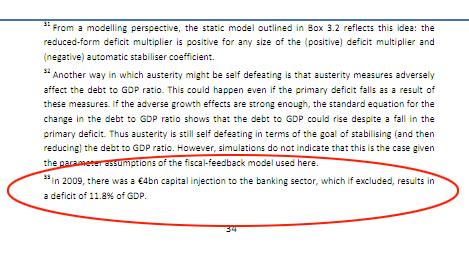Fiscal Advisory Council makes a bad start worse

The Fiscal Advisory Council has engaged in serious manipulation of the presentation of the facts on the effects of austerity. This does not bode well. By Michael Taft.
In my post on the Irish Fiscal Advisory Council’s first report, I pointed out a significant error. In short, they claimed that the underlying deficit fell from 14.3% in 2009 to a projected 10% in 2011. This, they claimed, proved that austerity was working.
Except that they got the numbers wrong. The deficit only fell from 11.8% to a projected 10%. Which begged the question – could spending cuts and tax increases of over €20 billion (over 12% of GDP) that resulted in a fall in the deficit of 1.8% really be described as successful?
I contacted the Council with this mistake. On Tuesday they redressed this error – by re-issuing the report. But they only ended up compounding their initial mistake. Instead of acknowledging the flaw in their argument, they engaged in a number spin designed to mislead readers. This is not worthy of a panel of independent experts and undermines the credibility of the Council.
Let’s recap the argument. In their report, Fiscal Assessment Report, they claimed:
“Austerity measures are working to reduce the deficit.”
The argument they used to substantiate this was as follows:
“...the General Government deficit is improving. The underlying deficit has declined from 14.3 per cent of GDP in 2009, to 12 per cent in 2010 and to a projected 10 per cent this year.”
The problem was that the underlying deficit (the deficit excluding special, once-off bank payments) was 11.8% in 2009, not 14.3%. If they had used the correct numbers the claim that “austerity measures are working” would have been seriously weakened (indeed, they would have to admit that the deficit actually rose in 2010). To compound this mistake, they claimed in a footnote that there were payments to Anglo-Irish in 2010 when there were actually none.
In their updated report, they still claim that “Austerity measures are working to reduce the deficit.” But then they proceeded to deliberately obfuscate. Here is their new argument:
“…the General Government deficit is improving. The General Government deficit has declined from 14.3 per cent of GDP in 2009 to a projected 10 per cent in 2011.”
They have jettisoned the ‘underlying’ deficit measurement since it didn’t suit their argument. Instead, they used the headline, or General Government deficit – even though that is distorted by the capital payment to Anglo-Irish in 2009. It gives the appearance of considerable progress being made when actually very little progress has been made.
However, they then engage in a crude ‘cover your backside’ exercise by putting into a footnote the following:
“In 2009, there was a €4bn capital injection to the banking sector, which if excluded, results in a deficit of 11.8% of GDP.”
So they admit the correct numbers but separate them between the main text and a footnote. The main text was written to mislead – using numbers to vindicate their claim that austerity is working. The footnote was written to correct the mistake. The reader is left perplexed – which is the intention.
What the Fiscal Council did was make the facts fit their pre-conceived argument. What the Fiscal Council did not do is create an argument based on the facts. What the Fiscal Council did was start with a conclusion and then manipulate the presentation of uncomfortable facts. If a first-year economics student tried this on, they would be shown the door.
In one sense, whether this proves austerity is working or not working is beside the point. The issue is the treatment of data by the Fiscal Council.
On the website there is a page entitled ‘Transparency’. It claims:
“The Irish Fiscal Advisory Council is committed to a policy of transparency.”
Yet, the Fiscal Council didn’t alert anyone that they had revised their first report, nor did they (as would be the norm) call the current edition of the Fiscal Assessment Report an ‘update’ or indicate in some way that this is a revision owing to mistakes in the previous draft. Nor have they left any trail as to their ‘correction’; there is no indication that the draft has been changed. This, in addition to their manipulation of the deficit data, does not bode well for claims to transparency.
The Fiscal Council was intended to be a positive innovation – a body that would provide an independent assessment of economic and fiscal policies based on a transparent treatment of fact. Unless they rectify this mess of their own making then the public should treat all future publications and reports from this source with extreme scepticism.
* * *
NOTE: The Fiscal Council has removed the first draft from their website. We have embedded it below. The section in dispute is on page 34 of the text - the paragraph above the box.
Irish Fiscal Advisory Council October 2011 - First Draft
{jathumbnailoff}
